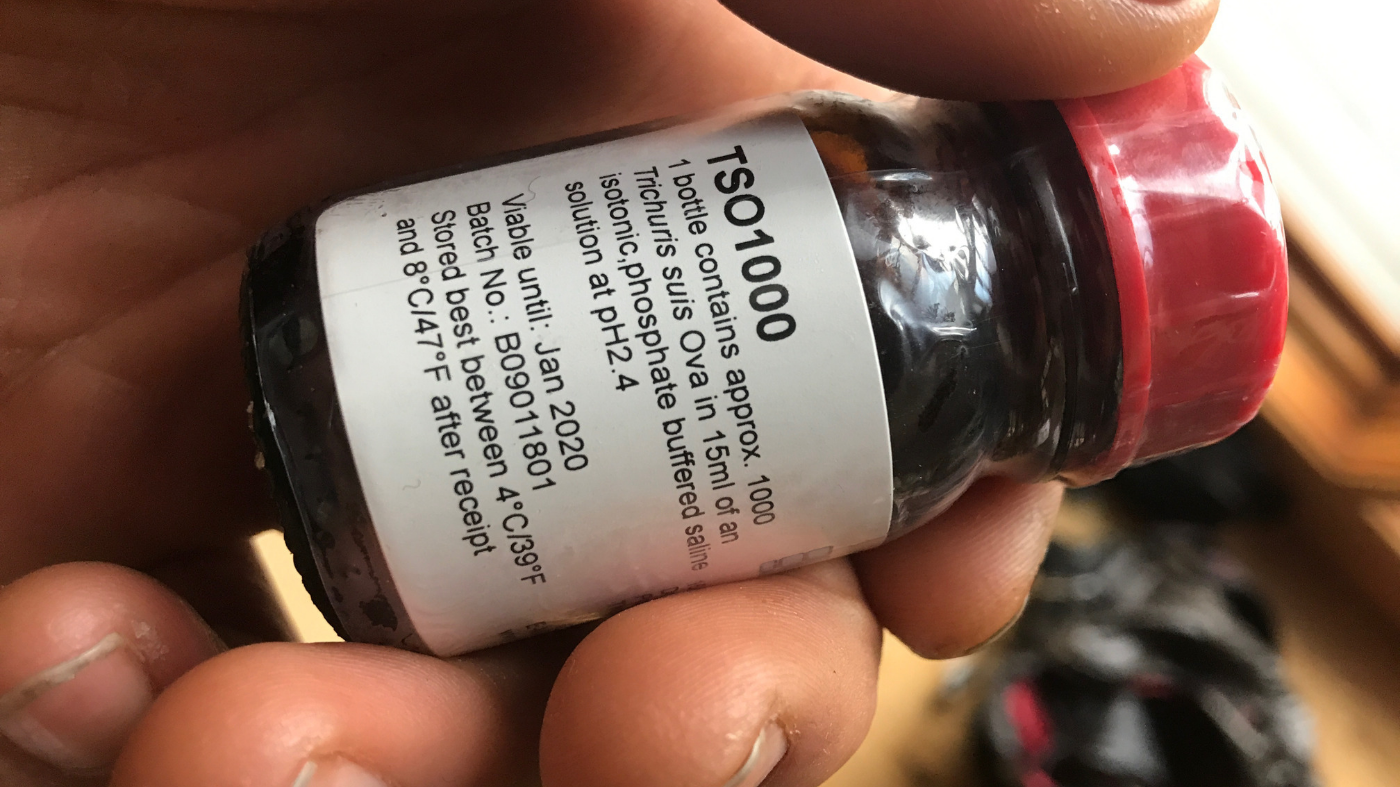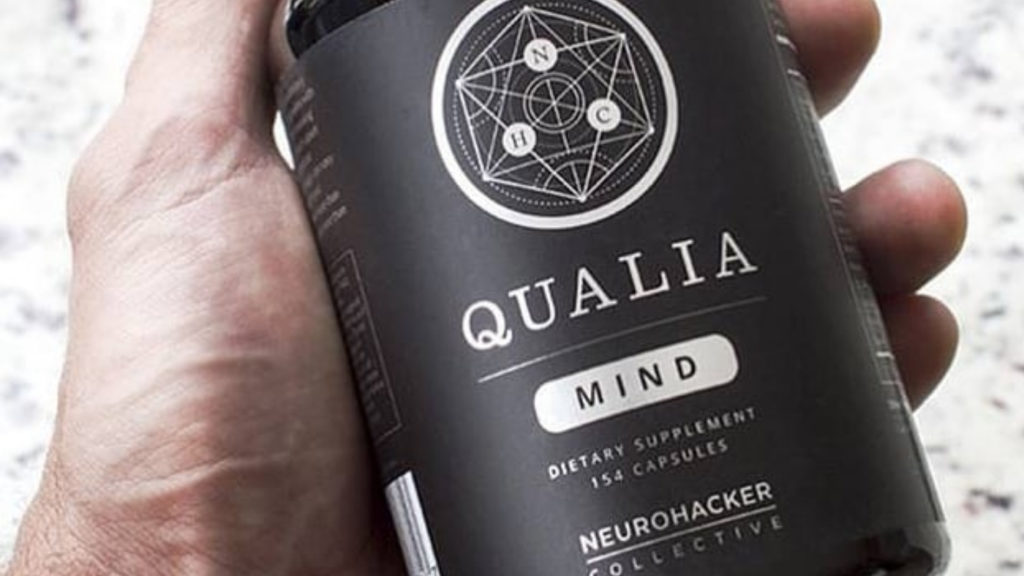October 2, 2018
For the past four months, every two weeks, I have been wandering over to my refrigerator, fetching out for myself a shotglass-sized vial of pig whipworms from Thailand, and swallowing the entire vial. But I don’t stop there. Two weeks later, I drip a tiny pipette down my throat of rat tapeworms, harvested by a laboratory in the UK.
Why the hell would I be inoculating myself with what are widely considered to be vicious little parasites? It all started when I was visiting with a fellow health enthusiast, who informed me that he had been exploring the world of something called “helminthic therapy”, that both he and his brother had been swallowing these kind of worms every 10-14 days, that his usually problematic gut had “never felt better” and that he planned on continuing to eat tapeworms and whipworms for the rest of his life. I was intrigued.
And thus I proceeded to take a deep dive into the wonderful world of helminthic therapy.
How Helminthic Therapy Works
The modern, underground health interest in whipworms and tapeworms appears to have been sparked by a December 2012 Men’s Health Magazine article entitled “The Frenemy Within: The New (Ancient) Cure for Immune Disorders”, in which the author describes the story of a 45-year-old muscular 200-pound blacksmith named Tom Bear from Massachusetts, who from childhood suffered the effects of hundreds of allergies from green beans to peanuts to pollen, but completely cured his hampered immune system by intentionally infecting himself with eight tapeworm larvae.
I then found several articles published in peer-reviewed literature, including “Worms and germs lead to better immune function“, “Reconstituting the depleted biome to prevent immune disorders” and “Human helminth therapy to treat inflammatory disorders- where do we stand?” along with this fascinating New York Times article on the Hygiene Hypothesis, that backed up the efficacy of this so-called “helminthic therapy” for not only immune system modulation, but also prevention of diseases like prostate cancer, arthritis, and Parkinsons.
In the late 1980’s, medical researchers in the US and Europe developed a popular theory entitled “The Hygiene Hypothesis” which helped to explain why people living in developed countries seem to have a high prevalence of allergic disorders and immune system issues. Essentially, the Hygiene Hypothesis states that the human immune system is dependent upon exposure to a variety of organisms, in particular “old friends” (AKA parasitic helminths such as tapeworms, whipworms and hookworms), for proper development and functioning. The reason for this is believed to be that we co-evolved with these micro-organisms, which – until the advent of an ultra-clean, indoor-dwelling, industrialized society – have almost always been present in our bodies, and are in modern days present in the guts of many outdoor-dwelling hunter gatherer tribes. The recent and relatively rapid removal of these organisms from our bodies by modern medicine is now believed by many physicians and scientists to be a major factor in the malfunction of many people’s immune systems.
In a nutshell, helminths are parasitic worms. There are many different species of helminths – most of which have gotten a bad rap because people tend to acquire helminths via contact with contaminated food, water or soil, and because colonization with these helminths seem to be most common in children living in tropical areas with poor sanitation. However, this same helminthic inoculation has emerged as one possible explanation for the low incidence of autoimmune diseases in less developed countries, along with the significant and sustained increases in autoimmune diseases in industrialized countries. As a consequence some seemingly beneficial helminth have found their way in the world of gut and immune system therapy back to the human gut, intentionally, for the avoidance of immune-related disorders and as a form of nature’s most powerful probiotic for issues including Crohn’s disease, ulcerative colitis, (IBD), multiple sclerosis, type 1 diabetes, asthma, rheumatoid arthritis and many others.
Which Tapeworms & Whipworms I Use
So in a form of culinary self-immersive journalism, I got my hands on some helminths and began dosing. I ordered my first batch of helminths – HDC (Hymenolepis diminuta cysticercoids) – from Biome Restoration Ltd. in London.
Hymenolepis diminuta, which sounds far more attractive than describing what they actually are in layman’s terms (rat tapeworms) are one of the most widely studied organisms that colonizes the guts of vertebrates, and benefits include elimination of autoimmune diseases and near instant healing of gut issues such as Crohn’s disease. It causes little or no adverse symptoms in its usual primary hosts (common rodents such as laboratory rats and pet hamsters),and colonization of humans is rare but generally without any adverse symptoms, even in developing countries where the organism is very common.
The HDCs from London are raised in grain beetles called Tenebrio molitor, which are normally found in the human food supply as a harmless contaminant in a wide variety of grains. These grain beetles, in turn, subsist strictly on materials prepared for human consumption (in the case of the London lab, oatmeal). So all potential contaminants accompanying the cultivation and isolation of HDCs from grain beetles are derived from a common product (oatmeal) already consumed by humans in post-industrial culture. In stark contrast, other helminths currently in use (including those approved by the US Food and Drug Administration for clinical trials) are isolated from the actual feces of humans, rodents or pigs prior to use.
Gross. I’ll stick with the oatmeal version, thank you very much.
I then ordered the pig whipworm Trichuris suis (TS) from Tanawisa Company in Thailand. Under controlled conditions, at least some helminth species, such as TS, seem to interact with humans in highly complex and apparently beneficial ways, modulating the immune system in preliminary studies while positively impacting inflammatory bowel and other autoimmune diseases. For example, TS dosing has been shown to produce significant and long lasting improvements in Crohn's disease, probably by modulating parts of the immune system responsible for producing gut inflammation (known as Th1-type inflammation). FDA has even granted TS the status of Investigational New Drug, allowing clinical trials in humans, and currently, a clinical trial is underway to assess the possibility of TS therapy in autism treatment.
Summary
So what have I personally noticed since beginning my experimentation with helminthic therapy nearly four months ago?
Thus far, in the past four months, not only have I had zero side effects, including the dreaded itchy asshole or tiny baby worms in my poop, but I’ve actually felt far more gut comfort, particularly while exercising in hot weather, which is a notorious trigger for leaky gut and GI issues in most athletes. Not only that, but considering that the effect seem to be somewhat similar to a fecal microbiota transplant (FMT), also known as shoving someone else’s poop up your backside or swallowing poop from a donor in the form of a poop pill, the worms seem slightly (albeit only ever so slightly) less stomach-turning.
Of course, if you decide to try this immune-boosting and gut-healing strategy out personally, proceed at your own risk. I am not a doctor and this is not to be taken, interpreted or construed as medical advice. Please talk with a licensed medical professional about this. These are just my own personal thoughts and not a prescription or a diagnosis or any form of health care whatsoever.
Do you have questions, thoughts or feedback for me about helminthic therapy? Leave your comments below and I will reply!














What dosage did you take of each and for how long?
I been doing human whipworm and human hookworms for years. Together with BPC-157 and fmt capsules it’s the only thing with real effect. I tried other helminths that normally had another host animals than humans and never had much effect from them. Great to hear they work for you!
What do you use to get rid of them when you have finally had enough? And how do you prevent the brain cysts forming?
They naturally leave the body. They are not the type that "set up shop" in the gut, so to speak. And I have never heard of brain cysts forming from this practice.
Even the human ones die… so re dosing is needed for them too just 3months to a year depending on how quick you kill them. PIP all of the ones meantioned are gastrointestinal helminths thats where they live and die. other ones that are not used therapeutically like toxocaris case the cysts. Just like bacteria not all of them are ideal. So theres a group that are essentially probiotic in nature. (surprise surprise ;) )
Hmm.. I find this article interesting. I have been studying the gut and autoimmune issues and diseases for the past year in pursuit of curing myself from mine. I had chronic idiopathic/ delay pressure urticaria where I was breaking out in hives everyday, all day for over a year. It was obvious that pressure and stimulation would trigger them but I knew there was something else triggering them. I started researching about bacterias and parasites that can trigger this reaction. I started checking in with myself intuitively to see what to ingest to rebalance myself. At the time, I was working with EOW and Doc Nick had so many fun medicines to work with. I found that ingesting pine oil, also known as turpentine, daily was reducing my symptoms. There’s a protocol to kill parasites. Also, I took msm daily and d-limonene/spirulina combinations. I finally am in remission and my body is coming back to center. I realized that autoimmune imbalances are a symptom of other irregularities in the body. I see why inoculating yourself could be beneficial…and I also see why a parasite detox would work too. Finding the balance to come back to center looks different for all of us. Lovin’ your process. ✌
Hi Erica
Who and where is EOW and Doc Nick.
Can you please supply contacts?
Thanks, Mark
I have used the Biome from UK for several years but never the worms. One negative for me is the foreign fee that shows up on my visa because it comes from UK. Sometimes I have freaked out thinking the fees were from visa. yh
Hey Ben,
My brother has pretty severe Colitis and Crohn’s which has basically made him bed ridden. He was weighing around 180 and is down to 132. He’s basically malnourished and in pain 24/7 so he doesn’t eat more than once per day. Would it be safe for him to try tapeworms considering his weak state and condition?
I had a friend with severe ulcerative colitis try this with no benefits whatsoever but the same person thought BPC-157 was practically a miracle. That’s totally anecdotal but it’s relevant and true so I thought I’d tell you.
Hey Christa thanks for that recommendation. I’m going to grab some BPC-15 now and see what happens. I’m going to get my brother on a vial of 30 organisms every 2 weeks for about a month and see what happens. Judy over at Biome Restoration is trying to set up a recovery plan which she says will take up to 6 months but can be pushing upwards of 60 organisms every 2 weeks at the end of it!
It took time for him to get so sick. It will take time to heal. You’re an awesome brother!
What is BCP-157 and where do you get it? Is there a way to get FMT capsules in the US?
where do you get as a reliable source? I have found many sources but worry about purity.
Check this out: http://bit.ly/2LHtST6
Hey Ben. Thanks for bringing this up. I’d heard of this a few years back but never discovered a legit source for the little guys.
What are your thoughts on helminthic therapy in conjunction with (what appears to be) my own case of leaky gut? I don’t know if I need to wait until things have healed up before ingesting the worms or if they might actually play a role in the healing process. Got any guesses here? My naturopath handed me the results of a food sensitivity panel two weeks ago, grimaced and apologized as she passed me the results. What’s particular frustrating is that I don’t have symptoms. She’s confident it’s a leaky gut issue. I’ve done an elimination diet in the past; this has taken things to a whole new level of complicated. I miss a lot of these foods and I’m wide open to doing whatever I can to heal things up.
I’m wide open to input/ideas/links/etc. I’m doing fairly regular BPC-157 along with some supplements but would like to add to my arsenal of awesome.
Thanks, man!
Hi Alan, have a look at this page in the Helminthic Therapy wiki.
Helminthic therapy and leaky gut syndrome.
https://helminthictherapywiki.org/wiki/index.php/Helminthic_therapy_and_leaky_gut_syndrome
For me its was 100% worms as I reacted to probiotics as well as many foods. But I had many issues in gut. IBS leaky gut gluten allergy, most foods (only 3 left). asthma , eczema. psoriasis sciatica ziphodynia and the favourite hayfever.
At a year and a bit of treatment everything is resolved. I am slowly getting more tolerant to gluten(allergy under 4ppm)… today I can eat donuts or cupcakes without symptoms (probably not an entire pizza). But as that was a allergy I microdosed gluten asymptomatically orally.. what a novel idea! Blood tests normal and I stopped taking supplements.
Think i might try it also. I will name her Esmeralda! :-)
In 1944, my mother took tapeworm to lose weight. She became horribly thin and sick. The doctor had to evidently poison the tapeworm. She said that over a week long segments of tapeworm was expelled in her poop. How is this different than what you are doing?
My mother , 5’4, went from 130 lbs to 85 pounds. She always fought weight but used her experience to warn us about crazy diets.
Hello Denise. First of all, I am not a doctor and this is not to be taken, interpreted or construed as medical advice. That said, I have no idea the source from which your mom acquired tapeworms, and as the article describes, this experiment was not intended for weight loss. The purpose for my ingesting helminths is entirely different!
Was the tapeworm your mom took alive? I assume the worms taken by Ben are dead, same as dead meat,eggs, etc.
The point is to get live tapeworms to thrive in your gut. It’s not like a killed vaccine. The tapeworm eggs under discussion are viable, at least they should be!
The ones mentioned we are using aren’t quite so invasive. The rat tape worms are like dots which aren’t even visible.
Im tempted to try this…I got acute colitis 50 years ago on a surfing trip to Mexico. I had relentless diarrhea, cramps, and lost a lot of weight. Finally got it under relative control, but have never had well regulated bowels since. Im 76 now. I figure wtf, the only time I have had good bowels is when I took morophine post surgery, but we know the dark side of that remedy. As for getting advice from a medical professional before ingesting worms…good luck. Thanks for working on the edge, and offering your body for science.
I recently heard that if someone from a developed country goes to India, that person’s biology is forever changed. No explanation given. Maybe this is an example of this? I hope not and that you get a cure, at least not stuck with medication with risky side effects.
Do you eliminate the parasites in your stool or do they continue to live and grow inside of you?
From the podcast I listened to where Ben talked about this he has selected varieties that die off on their own. That’s why he needs to keep dosing himself.
Thank you for writing this article. After 10 years of suffering GI, candida, auto-immune and allergy issues, I was finally tested and I have a stomach parasite Blastocystis Hominis. I have had it so long that I have developed Ulcerative Colitis as well. I tried the antibiotic Flagyl, the triple homeopathic therapy of Wormwood/Clove/Black Walnut, fasting and elimination diet – all with no success. Based on this article, what are your thoughts and recommendations for me?
FYI…I met you at Cal-Jam earlier this year and we had spoken briefly about this but at the time, I did not know I had parasites and UC. Thank you for your time.
Scott the presence of some things are not necessarily the cause. As you get more dysbiosis in the gut a range of things cam occur. Like it just being more favouirable to certain things. If you have cleared all the things you thought were the problem then I would say they were just not…. merely along for the ride. scott you can look at helminthictherapywiki dot org at the 4 species used.
Does it make you lose weight because its eating your food and nutrients in your stomach?
Not really because the ones that colonize you are so small that even a functioning therapeutic colony would only ingest a tiny amount of blood. The rat tape worm are tiny and don’t colonize you.
Holy hell
Do the worms die off or becomes a permanent pet ?
There are ones that colonize you but even the longest lived commonly used one, necator americanus lives 3 years at most. So you need to redose. The other ones are more transient and just pass through you without colonizing you so those need to be taken more regularly for effect.